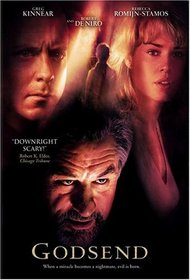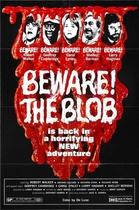Our editor-in-chief Nate Yapp is proud to have contributed to the new book Hidden Horror: A Celebration of 101 Underrated and Overlooked Fright Flicks, edited by Aaron Christensen. Another contributors include Anthony Timpone, B.J. Colangelo, Dave Alexander, Classic-Horror.com's own Robert C. Ring and John W. Bowen. Pick up a copy today from Amazon.com!
Godsend (2004)
After watching Nick Hamm's Godsend, which stars Robert De Niro, Greg Kinnear, and Rebecca Romijn-Stamos, I sent an e-mail to friends stating that my wife and I wanted another child, but due to physical complications, we couldn't conceive. Subsequently, we turned to Godsend, a fertility clinic specializing in stem cell research, gene mapping, and genetic engineering. Godsend was founded by "one of the true visionaries in fertility," Dr. Richard Wells. Even more devilishly, I pointed them to Godsend's Website.
Here were their responses: "Dude, you have to be kidding me." "What are you thinking about?" "You guys have lost your minds." "Man, wake up, you're going to have a cloned kid?" While watching Godsend, I found myself shouting the same criticisms at the television.
Although I fooled my friends, I achieved one important goal: I sold them on the film. That's because the Duncan family is forced to make a similar choice in this modern-day morality tale. However, the Duncans arrive at their decision under entirely different circumstances.
Paul and Jessie Duncan (Kinnear and Romijn-Stamos) are happily married and the proud parents of an eight-year-old boy named Adam. Shortly after his eighth birthday, Adam is tragically killed in a freakish automobile accident. While exiting church after the funeral services, they are naturally traumatized. Dr. Richard Wells (De Niro), a world-renowned geneticist, approaches the grieving couple. He offers to "recreate" Adam using the original Adam's cells, but if the parents consent, they must do so within 72 hours to preserve the integrity of his cells. The Duncans eventually consent, and for the first eight years, Adam enjoys a normal childhood. But after his eighth birthday, Adam dramatically changes. A nightmare follows for the Duncans along with a conspiracy of monumental proportions.
Godsend works as both a cautionary tale and a chilling horror film. Hamm's directorial career started in England's theater district, and his resume blossomed by directing a number of Shakespeare's plays for European theaters. He moved to television in the late 80s, and here, in his first U.S. film, he appears at ease in this complex tragedy that offers few easy answers. Godsend refreshingly tackles the complex and often misunderstood topic of stem cell research, and although at times the plot stumbles, its message is clear: genetic engineering can provide society some tangible benefits, but ultimately, when conducted by the wrong people and for the wrong reasons, those benefits are ethically unsound and transitory. Simply stated, the long-term cons of genetic engineering far outweigh the short-term pros.
Films like this one, which overtly address modern ethical paradoxes, make one scratch their heads about that "liberal Hollywood" label because Godsend is a resounding indictment of stem cell research, a political issue typically supported by liberals and condoned by conservatives. Interestingly, the film avoids patronizing sermons about the religious problems stem cell research raises. Its argument is almost entirely secular, which makes its title misleading, and the argument, when cast in the genre of horror, is an effective one.
The three leads are solid. De Niro gives another steady performance, and as is often the case in his latter films, he blends with younger cast members by not allowing his domineering presence to overwhelm the screen. This is not by accident; his numerous skills as an actor, most notably his ability to avoid overacting and his appreciation for subtlety and omission, allow Godsend's cast and narrative to flourish. In a strange way, he adds by subtraction. Kinnear and Romijn-Stamos also effectively portray bereaved, haunted parents. They maintain chemistry throughout the film even amidst the turmoil they face. The film fumbles early by not developing their characters enough and not providing them more time to fully express their mourning, but it quickly recovers.
Kinnear is convincing when balancing passion for his son with the despair and rage he directs toward the conspirators. He is also convincing in portraying a whistleblower-turned-investigator who wants answers to the mystery haunting his family. And since I was only familiar with Romijn-Stamos The Model, I was equally impressed by her performance. While nothing to write the Academy about, she was particularly effective as the terrorized mother, and she deserves more roles in horror films. Perhaps my expectations were too low for her. Lesson learned.
Unfortunately, horror fans will probably realize that too many of the horror scenes are not exactly original. They emerge mostly in the film's second-half and draw from a number of horror classics including Psycho, The Shining, and The Sixth Sense, to name a few. There are also a number of clichés such as the "scary shed," the picked-on child turned monster, and the closet porthole that haunts so many of our nightmares. However, these scenes are scary, and the editing used to create the patchwork flashbacks that haunt the new Adam work well.
Other than a handful of flaws, such as the difficult pill to swallow that magically relocates the Duncans after Adam's surgery to a new upstate Godsend enclave (this is far too good of a fairy tale for me to accept), Godsend is worth your time. I've seen a lot of films far better, but I've also seen too many that are far worse. As a De Niro fan, I couldn't resist. Of course, the Duncans couldn't help themselves either. But unlike their situation, this temptation is worth considering.
Trivia:
The role of Richard Wells was originally little more than a cameo. It was expanded when De Niro signed on.








